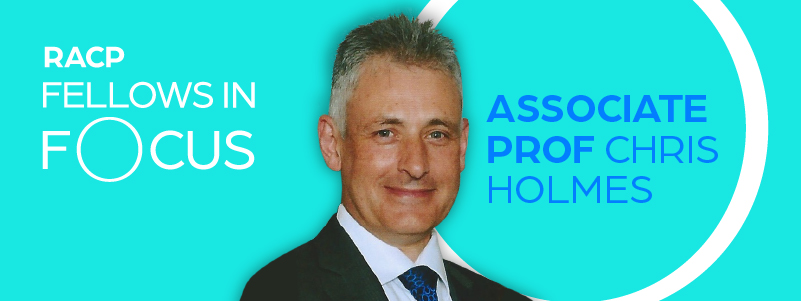RACP Fellows in Focus: Associate Prof Chris Holmes
Date published:
14 Apr 2022

“I was fortunate to do my training at a time when there wasn't the pressure for training positions that there is now,” reflected Associate Professor Chris Holmes. “I was lucky to be able to experience a wide variety of different training opportunities, particularly when I was doing Basic and Advanced Training.”
Chris, a nephrologist specialising in renal medicine in Bendigo, Victoria, has a “complicated history” in medicine. He started by doing intensive care medicine, but quickly discovered that wasn’t where he felt comfortable or could best use his skills, “I did intensive care medicine for a year, but I wasn't that well suited to it. Then I had a bit of a career shift and did geriatrics for two years. Geriatrics training then led me to another epiphany where that didn’t feel right for me, even though the skills I learned there I still use every day. Finally, I got offered a job as a renal trainee.
“I had done renal medicine as a junior HMO at the Austin Hospital unit. As luck would have it, I had been rotated there twice over two years in my Basic Training.”
After forging strong relationships with some of the senior consultants, an opportunity presented itself, which Chris couldn’t turn down – working in renal medicine. “What impressed me mostly with renal medicine was, in between the bells and whistles of intensive care technology with dialysis, and to a certain degree transplantation, the longitudinal care that was required. One of the moments that I remember best was with one of my senior consultants. One of his very long-term patients, someone he’d looked after for 20 years, was dying and at the end of his life effectively with multi-system disease. This consultant who was a very interesting and challenging old-style physician, very directive and didn't tolerate fools, ended up crying at the bedside of this patient and was unable to continue the ward round without taking some time out to kind of compose himself. This was a side of the senior consultant that I'd never seen and he had never shown me as a trainee, but it made me realise just how invested renal physicians got in their patients over a very long period of time. It's almost unique in the field of medicine. I found that particularly attractive.”
To work in renal medicine certainly requires a particular skillset and Chris acknowledged this stating, “I like to think that I'm a very analytical and critical thinker with good communication skills.
“I listen to patients, don't jump to conclusions and I make decisions based on sensible evidence, not the latest fad. I like to think about issues and problems and then apply them to a particular patient situation. I'm not sure that that's necessarily a particularly unique skill, but I think it’s particularly valuable in this time where evidence is becoming very much more complicated. What is true, what is fake and what you believe, it takes clear thinking to navigate reliable medical evidence and to make decisions based on the best available information.”
Sometimes having the skills doesn’t always mean you’re fully prepared to deal with incoming problems. Like all areas of medicine Chris’ specialty is fit-to-burst with poignant challenges. Notably was the challenge of providing renal medicine in a regional area. Through his hard work and determination over the last 20 years, he established a facility that, apart from kidney transplants, provides all the renal needs for the area. “We've developed something that means our patients and community gets a much, much better standard of care and doesn't need to travel for it. It's constantly evolving. The growth is higher than the state average, and there's a constant need to keep pushing the boundaries, to try and improve, to get more resources, to support the community and provide the service, because country patients do not want to go to metropolitan city centres. I'm very proud of the development of the services that we've created in Bendigo.”
During our conversation, we got the distinct impression that Chris was just getting started. When the question of what he would like his legacy to be in medicine, he calmly retorted, “If I leave behind a culture of excellence in clinical care, education and curiosity about what the future might hold amongst colleagues, junior doctors and future doctors, I'd be very happy with that. I would love to leave behind something that will continue to evolve and continue to improve so that there are, there is, better healthcare for regional communities.”